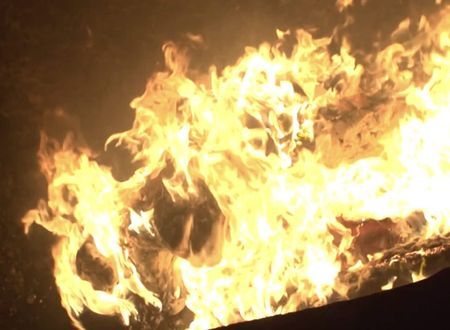Jai Sri Hari and a warm hug on a cold winter’s day to my Parivar. Today, I want to share my thoughts on a problem that has stayed with me for many years. Would I have progressed faster on the spiritual path if I had been a brahmachari? The answer came to me as a story at three in the morning.
The Confused Prisoner
A judge in the high court received Deeksha from a renowned saint. He always had strong monastic tendencies and had continuously harbored a deep desire to renounce the world and live an ascetic life. He was never satisfied and constantly blamed his family for holding him back in his spiritual pursuits.
One hot summer’s night, the judge feverishly chanted his guru mantra, pleaded with him for guidance, and drifted off to an uneasy sleep.
He was presiding over a courtroom trial of a sensational case. The police had finally caught a con artist/madman who had been scamming people for months. During the day, the conman would wear the “gerua” color robes of a Sanyasi, sit outside different temples, and tell people their future. He had an uncanny ability to sense an individual’s worst fear and pronounce it aloud. They would beg him for a remedy, and he would charge a hefty sum for it. His “upayas” never worked after months of being tricked, people complained to the police.
The same conman also dressed as a wealthy householder and rented a fancy bungalow. He threw lavish parties and invited important people to grace the occasion. He gained their trust over a few months, suggested various Ponzi investment schemes, and fleeced them for significant amounts of money.
The police finally arrested him, seized his assets, and produced him in court. He was charged with using disguises to trick people and committing financial fraud. Surprisingly, he wanted to present his defense and refused a lawyer.
The judge took a moment to study the man before beginning the session. He was uncommonly handsome. It took the judge a few seconds to realize why he felt this. Every person we meet has some asymmetry. It could be a tilted nose, crooked teeth, eyes close together, or slightly uneven ears. This man’s face, in fact, his whole body, was perfectly proportional. The judge shook his head to clear his thinking and told the man he was charged with thievery and fraud. He asked if the conman wished to contest it?
Man: “Are you charging ME with fraud and theft?”
Judge: “Of course!! Who else is standing here?”
Man: “Then, I wish to plead innocent.”
Judge: “I have a court full of witnesses who swear you fleeced them as a sanyasi and a nobleman. Why are you lying to us?”
Man: “You asked me if I am guilty, and I said No. The sanyasi and the nobleman are indeed guilty. You should give them the harshest possible sentence.”
(Giggling and confused silence in court)
Judge: “What nonsense is this? You are the sanyasi and nobleman. You tricked all these people. Do you think you can confuse me with such stupid logic? Can you produce the sanyasi and the nobleman in court if they are different from you?”
Man: “Of course, your honor.” He walked over to the evidence table, picked up his ochre robes and fancy dresses, and held them up. He held up the robes and said, “Sanyasi.” He dropped the robes, held up his fancy robe, and said, “Nobleman.” “Please feel free to punish them.”
Judge: “I will give you the harshest punishment possible for wasting the court’s time. You are the noblemen; you are the saint. Do you understand?”
Man (perplexed): “How can it be? When I dress like a saint, the world treats me as a saint. When I dress like a nobleman, they treat me like that. How can I be the same person?”
Judge (concerned for the individual): “You are the saint. You are the nobleman. You are simply changing clothes. They are not different people.”
Man: “Are you sure? Can you tell me again?”
Judge: “You are the saint, and you are the nobleman. You are the saint, and you are the nobleman.”
Man: “I am the saint. I am the nobleman. Tav-TVam-Asi. I am THAT. Tat-Tvam-Asi. I am THAT.”
Judge: “Do you understand?”
Man: “I always knew that. Did you? TAT TVAM ASI. You are the householder. You are the brahmachari.”
Judge (Stunned into silence): “I am THAT. I am THAT.”
The man dissolves into a ring of light, and the judge wakes up from his sleep and keeps muttering, “I AM THAT. I AM THAT.”
My Conclusion
This story is my humble attempt to help you understand what I understood experientially. Advaita Vedanta uses such stories to help explain what cannot be described otherwise.
I had strong monastic tendencies as a child. I told myself I would never marry in life. However, it changed when I met my wife. We have a fantastic marriage, but I sometimes wondered if I would progress better as a sanyasi.
After receiving initiation, I felt a strong pull to Advaita Vedanta, especially the phrase TAT TVAM ASI. Yesterday night, I woke up at three in the morning, and this story suddenly came to me.
Advaita Vedanta says that the only truth is Brahman. The same Brahman resides within everyone once you drop the terminology (sanyasi or grihastha). The journey is purely inwards without any consideration for your external circumstances. Our current situation is precisely what it’s meant to be. Our desires and our Karma have placed us where we are today. We will make phenomenal progress if we drop the labels and focus on the journey inwards.
In my case, I realized that spirituality and sadhana are arduous work. My mind is always looking for excuses to slink out of the concentration and dedication required. Hence, I always make excuses, including blaming my current situation for lack of progress. However, the truth is that my family is at the core of my spirituality. My ability to love unconditionally, be generous, and be patient is learned and practiced at home and work. When I do my sadhana, I automatically get into the brahmacharya state for a month and then slip back into the role of a grihastha. You can wear these roles like robes and drop them when necessary.
The life of a brahmachari is not easy. I have observed and talked to some of them, and the WHAT IF question haunts them. Old Path White Clouds is a fantastic book about Buddha’s challenges when he set up his monastic order. Many monks were haunted by sensual desires, memories of their families, and they kept them at bay by various practices. The focus required for sadhana was spent to restrain their mind. Brahmacharya is a very challenging life situation, and if we end our lives with any desire, then as Swamiji says, nature will get us back to fulfill that desire.
Let me end by reiterating TAT – TVAM – ASI. You can learn more about Swami’s advice to households in this video. India has a rich heritage of devotees who were grihastha achieving the highest liberation under gurus such as Sri Ramakrishna and Lahari Maharaj. We are householders. In Swami, we have the foremost spiritual teacher of this century. We simply need willpower and discipline to walk the path.
I never imagined that I would contribute to the rich heritage of Vedanta stories with an original piece. I bow to my guru for providing this inspiration. May the divine bless you with the courage to walk your path.









Comments & Discussion
55 COMMENTS
Please login to read members' comments and participate in the discussion.